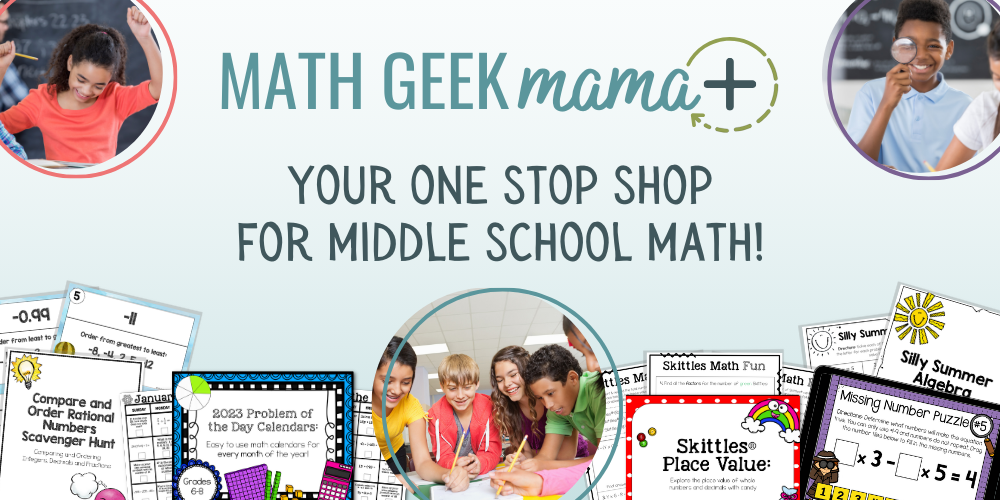Want to make geometry concepts engaging, meaningful & hands-on? This list of 10+ middle school geometry ideas is sure to have something you can use in your home or classroom!
Geometry in middle school opens up a world of exploration, giving students tools to understand shapes, space, and dimensions—all essential for visual problem-solving. Instead of boring worksheets, hands-on and creative problem solving tasks make these concepts much more engaging and will help with retention. Once students hit middle school, they move beyond simply naming & composing shapes.
Geometry topics cover everything from shape properties and angle relationships to calculating areas, perimeters, and volumes of 2D and 3D figures, as well as applying the Pythagorean Theorem. Building a strong grasp of these topics is crucial for students’ math confidence–and they’ll have more fun while learning!
If you’re ready to explore geometry in engaging, visual and hands-on ways, check out the full list of resources & ideas below. Resources are organized by math concept, making it easier to scan and find what you need.

14 Middle School Geometry Ideas & Resources:
To begin, take a look at some measurement activities, focusing on area, perimeter & circumference with 2D shapes, then find ideas for exploring measurements with 3D shapes.
Exploring 2D Shapes Activities: Understanding Shapes, Measurements & Angles
Explore 2D Shapes with Geoboards: When you’re ready to begin your geometry unit, start by creating, analyzing & calculating with shapes on a geoboard. In this post, you’ll find simple ideas to get started, along with free activity cards.
Explore Triangles with Geoboards & “The Greedy Triangle”: Want to help students understand triangles more deeply (including the triangle inequality theorem)? Create & compare triangles on a geoboard!
Exploring the Angles in Triangles: Dive deeper into triangle relationships as students cut up & measure triangles to discover some amazing triangle theorems.
Area of a Circle Exploration: Ready to dive into circle measurements? This hands-on, visual lesson combines a visual circle with a graphing calculator to consider what the area of a circle really means.
“Pass the Pi” Investigation of the Number Pi: Whether you are exploring circle measurements or just looking for a “Pi Day” activity, this lesson is a great way for students to discover the relationship between the circumference & diameter of a circle.
How Tall is a Building? Indirect Measurement Lesson: Lastly, once your students have learned about similar triangles, a great application is indirect measurement. In this activity, students are guided through using indirect measurement to find the height of their school building.
Exploring 3D Shapes Activities: Nets, Surface Area & Volume
Once students have a solid understanding of 2D shapes & their measurements, it’s time to move to 3D shapes. This opens up a new set of math to explore, and using hands-on discovery activities not only makes math more fun, it will help students better grasp the concepts.
Foldable 3D Shape Nets: Before you can begin measuring & calculating with 3D shapes, you have to understand the shapes themselves! I usually start by allowing students to decorate & fold their own set of 3D shapes using these nets, which we can then refer back to throughout our study of 3D shape properties & measurements.
Explore the Surface Area of Prisms & Cylinders: This hands on activity helps students connect the surface area to the area of each face & come up with their own formula.
Explore the Surface Area of Pyramids & Cones: This activity takes students a step further to explore pyramids & cones & how they are different from prisms.
Which Cup will Hold the Most Hot Chocolate? As an introduction to the volume of cylinders, you might try this interesting question. This is a great warm-up and an opportunity for students to think about how the width and height affect volume.
Explore the Volume of Prisms & Cylinders: Once again, this activity is hands-on, allowing students to see & discover volume themselves, and make sense of how it differs from surface area.
Exploring Pythagorean Theorem: Hands-On Activities & Real Life Application
Lastly, if your 8th graders are ready to learn all about Pythagorean Theorem & how it can help solve real life math problems involving right triangles. Once they’ve proven, understood and mastered this theorem, they will be ready for more complex calculations in high school geometry class!
Prove the Pythagorean Theorem with LEGO Bricks: This hands-on activity will help students ‘see’ the theorem and understand what all the letters & measurements mean.
Pythagorean Theorem in the Real World: Find two different printable sets to help students actually use and apply this theorem in real life.
I hope that gives you lots of engaging, hands-on & creative ways to make geometry come alive for your students! Don’t just list out formulas to memorize. Discover formulas, properties, theorems & more through play & exploration! Have FUN with these middle school geometry ideas!
Want more engaging & creative teaching ideas for your middle school students?
You might want to check out Math Geek Mama+, my all-access membership, which includes hundreds of ready to use materials for grades 5-8. There are even more geometry resources ready for you to download inside Math Geek Mama+.
LEARN MORE ABOUT MATH GEEK MAMA+ HERE.



